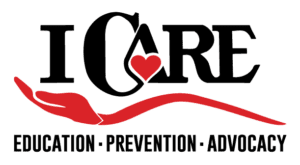It’s OK to say the “S” word: How talking to your kids about suicide can help keep them safe
Sponsored by I CARE Prevention Program
For many parents, the idea of talking about youth suicide and suicide prevention with their children can feel intimidating and frightening. But keeping the lines of communication open can help make those conversations a little easier, says I CARE specialist Jennifer Degruise.
As a mother of three children herself, Degruise says she makes a point to consistently talk openly and honestly with her children about their school adventures, struggles and successes. “I realize they may not tell me everything, but giving them the opportunity to ask questions and speak openly in a safe, nonjudgmental space is important to me,” she says.
Those heart-to-hearts often include Degruise talking with her children about suicide awareness and what they may hear about self-harm at school and in the media. It’s an issue she knows well, as her work with I CARE focuses primarily on suicide awareness and prevention and crisis management.
According to the Louisiana Department of Health (LDH), suicide is the third-leading cause of death for people ages 10 to 24 and ages 25 to 34 in Louisiana. In the nation as a whole, there was about 1 death every 11 minutes in 2021.
Warning signs that someone might be thinking about suicide include threatening to or talking about wanting to hurt or kill oneself, seeking access to pills or other means of suicide, talking or writing about death or suicide, feeling hopeless, feeling rage or seeking revenge, engaging in risky activities, feeling trapped, substance misuse or abuse, feeling anxious or unable to sleep or sleeping all the time, experiencing dramatic mood changes, having no sense of purpose in life, and withdrawing from friends, family or society.
“There are many resources to assist a parent whose child may be struggling with suicidal thoughts,” Degruise says. “If there is an immediate concern, visit your local emergency room or any place that can do a walk-in psychological evaluation. I also recommend calling 911 as an emergency option. Another valuable resource is the 988 Suicide and Crisis Lifeline, known locally as VIA LINK. Consider consulting with your child’s school counselor for more information and support.”
With her own children, Degruise says she also tries her best to monitor their social lives—including social media, places they go, and who they go with. “I remind them that their father and I would never be mad at them if they ever feel this way,” she says. “We let them know we will always do whatever we can to care for them and keep them safe.”
The I CARE Prevention Program offers drug, alcohol and violence prevention support and resources for families and schools within the Baton Rouge community. The program focuses on educating and empowering youth to make healthy choices, and its specialists provide crisis intervention, prevention workshops, and grief and trauma recovery support. Resources are available both in person and online.
Find out more about the I CARE Prevention Program at icare.ebrschools.org.













